-
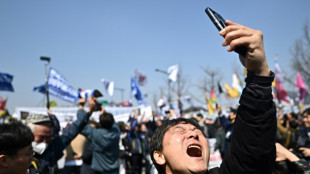 'Historic moment': South Koreans react to Yoon's dismissal
'Historic moment': South Koreans react to Yoon's dismissal
-
Israel kills Hamas commander in Lebanon strike

-
 Trump unveils first $5 million 'gold card' visa
Trump unveils first $5 million 'gold card' visa
-
Crashes, fires as Piastri fastest in chaotic second Japan GP practice

-
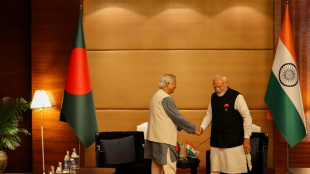 India and Bangladesh leaders meet for first time since revolution
India and Bangladesh leaders meet for first time since revolution
-
Israel expands ground offensive in Gaza
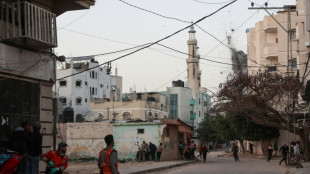
-
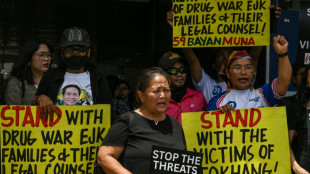 Families of Duterte drug war victims demand probe into online threats
Families of Duterte drug war victims demand probe into online threats
-
Stocks extend global rout after Trump's shock tariff blitz

-
 Kolkata's Iyer more bothered about impact than price tag
Kolkata's Iyer more bothered about impact than price tag
-
BP chairman to step down after energy strategy reset
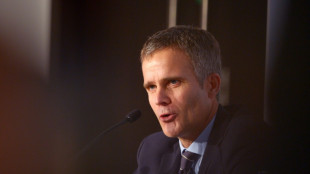
-
 Indian patriotic movie 'icon' Manoj Kumar dies aged 87
Indian patriotic movie 'icon' Manoj Kumar dies aged 87
-
China floats battle barges in Taiwan invasion plans
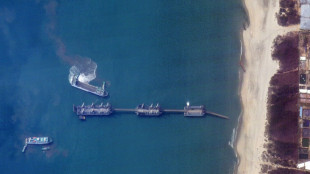
-
 McLaren's Piastri fastest in chaotic second Japanese GP practice
McLaren's Piastri fastest in chaotic second Japanese GP practice
-
South Korea seize two tons of cocaine in largest-ever drug bust
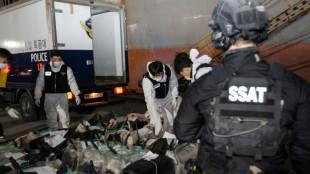
-
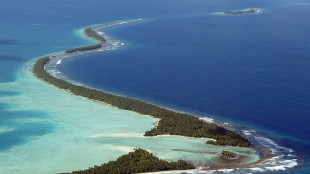 Pacific nations perplexed, worried by Trump tariffs
Pacific nations perplexed, worried by Trump tariffs
-
The race to save the Amazon's bushy-bearded monkeys

-
 TikTok must find non-Chinese owner by Saturday to avert US ban
TikTok must find non-Chinese owner by Saturday to avert US ban
-
Trump tariffs to test resiliency of US consumers
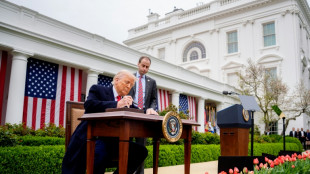
-
 Clamping down on 'forever chemicals'
Clamping down on 'forever chemicals'
-
Prominent US academic facing royal insult charge in Thailand
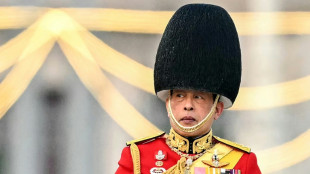
-
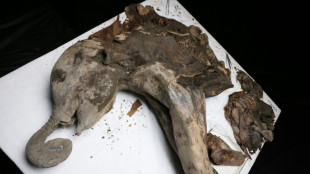 Yana, a 130,000-year-old baby mammoth, goes under the scalpel
Yana, a 130,000-year-old baby mammoth, goes under the scalpel
-
'Don't want to die': Lesotho HIV patients look to traditional medicine

-
 Curry scores 37 as Warriors outgun LeBron's Lakers
Curry scores 37 as Warriors outgun LeBron's Lakers
-
Crops under threat as surprise March heatwave hits Central Asia: study

-
 Japan PM says Trump tariffs a 'national crisis'
Japan PM says Trump tariffs a 'national crisis'
-
Security 'breakdown' allows armed men into Melbourne's MCG
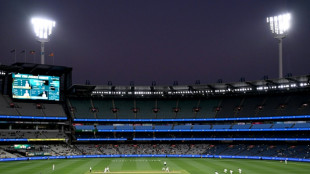
-
 Norris fastest in Japan GP first practice, Tsunoda sixth on Red Bull debut
Norris fastest in Japan GP first practice, Tsunoda sixth on Red Bull debut
-
Albon says Thailand taking bid for F1 race 'very seriously'

-
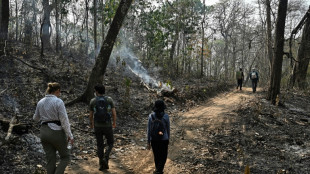 'It's gone': conservation science in Thailand's burning forest
'It's gone': conservation science in Thailand's burning forest
-
Protest as quake-hit Myanmar junta chief joins Bangkok summit

-
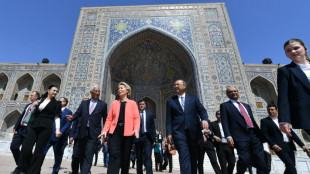 EU leaders push for influence at Central Asia summit
EU leaders push for influence at Central Asia summit
-
Asian stocks extend global rout after Trump's shock tariff blitz

-
 Lewandowski, Mbappe duel fuelling tight La Liga title race
Lewandowski, Mbappe duel fuelling tight La Liga title race
-
South Korea court upholds President Yoon's impeachment, strips him of office

-
 Liverpool march towards title as Man City face Man Utd
Liverpool march towards title as Man City face Man Utd
-
Finland's colossal bomb shelters a model for jittery Europe

-
 Athletes frustrated as France mulls Muslim headscarf ban in sport
Athletes frustrated as France mulls Muslim headscarf ban in sport
-
Korda downs Kupcho to stay alive at LPGA Match Play

-
 German industry grapples with AI at trade fair
German industry grapples with AI at trade fair
-
Irish school trains thatchers to save iconic roofs

-
 'Frightening': US restaurants, producers face tariff whiplash
'Frightening': US restaurants, producers face tariff whiplash
-
Cuba looks to sun to solve its energy crisis
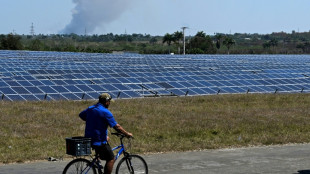
-
 Experts warn 'AI-written' paper is latest spin on climate change denial
Experts warn 'AI-written' paper is latest spin on climate change denial
-
PSG eye becoming France's first 'Invincibles'

-
 Late birdie burst lifts Ryder to Texas Open lead
Late birdie burst lifts Ryder to Texas Open lead
-
Five potential Grand National fairytale endings

-
 Trump purges national security team after meeting conspiracist
Trump purges national security team after meeting conspiracist
-
More work for McIlroy even with two wins before Masters

-
 Trump hopeful of 'great' PGA-LIV golf merger
Trump hopeful of 'great' PGA-LIV golf merger
-
No.1 Scheffler goes for third Masters crown in four years

Israel escalates War to crush Hamas
Israel has intensified its military campaign in the Gaza Strip, declaring an unwavering resolve to eradicate Hamas, the Palestinian militant group, regardless of the consequences. This latest escalation, which shattered a fragile ceasefire established in January, has plunged the region into renewed violence, with devastating tolls reported on both sides. Israeli Prime Minister Benjamin Netanyahu and Defence Minister Israel Katz have reiterated that the destruction of Hamas and the release of all remaining hostages are non-negotiable objectives, signalling a shift to an uncompromising strategy.
The ceasefire, brokered after 15 months of relentless conflict, collapsed on 18 March when Israel launched a series of surprise airstrikes across Gaza. According to Gaza’s Health Ministry, more than 400 Palestinians were killed in the initial 24 hours alone, marking it the deadliest day since 2023. The Israeli Defence Forces (IDF) claimed the strikes targeted Hamas "terror infrastructure," including senior officials such as Essam Addalees, the de facto head of Hamas’s government in Gaza, and Mahmoud Abu Watfa, a high-ranking security official. Hamas confirmed these losses but condemned the attacks as assaults on "defenceless civilians," urging international mediators to intervene.
Israel’s renewed offensive follows weeks of stalled negotiations over extending the ceasefire’s second phase, which aimed to secure the release of approximately 59 hostages still held by Hamas from the 251 abducted during the group’s 7 October 2023 attack. Israel demanded that Hamas free half the captives as a precondition, a proposal the group rejected, insisting on a full Israeli withdrawal from Gaza and a permanent truce. Netanyahu, addressing the nation, stated, "From now on, Israel will act against Hamas with increasing military force until it no longer poses a threat." Katz echoed this sentiment, warning that "the gates of hell will open in Gaza" if Hamas fails to comply.
The military strategy has expanded beyond airstrikes. On 19 March, the IDF resumed ground operations in central and southern Gaza, retaking the Netzarim Corridor—a strategic bisecting line—previously relinquished during the truce. Reports indicate Israel is preparing to deploy additional troops, including a division recently active in Lebanon, to intensify the ground offensive. Defence Minister Katz has also alluded to implementing "US President Trump’s voluntary transfer plan" for Gaza’s two million residents, a controversial proposal to relocate Palestinians elsewhere, which the Palestinian Authority and Hamas have decried as "ethnic cleansing."
The human cost has been staggering. Gaza health officials report over 49,500 Palestinian deaths since the war began, with the latest strikes adding hundreds more, including children and civilians. A notable incident on 22 March saw an Israeli airstrike on Khan Younis’ Nasser Hospital kill two, including a 16-year-old boy and Ismail Barhoum, a Hamas political bureau member, sparking outrage over the targeting of medical facilities. Israel justified the strike, asserting it hit a Hamas operative within the hospital, a claim consistent with its narrative of blaming civilian casualties on Hamas’s use of populated areas.
Internationally, reactions have been swift and polarised. The United States, under President Donald Trump, has expressed staunch support, with White House Press Secretary Karoline Leavitt affirming that "Hamas will see a price to pay." Conversely, Egypt, Qatar, and the United Arab Emirates—key mediators—condemned the assault, warning of catastrophic repercussions. The United Nations has highlighted the illegality of forced displacement under international law, while protests in Jerusalem reflect domestic dissent, with families of hostages accusing Netanyahu of abandoning their loved ones.
Despite the heavy toll inflicted, Hamas has shown resilience. Israeli and Palestinian sources acknowledge the group’s ability to absorb losses and maintain governance, with rocket attacks on Tel Aviv resuming on 20 March—the first since the ceasefire’s collapse. Analysts suggest that while Israel’s military superiority is undeniable, eradicating Hamas entirely may prove elusive given its deep-rooted presence in Gaza.
As the conflict escalates, the international community braces for a protracted war. Netanyahu’s pledge that this is "only the beginning" underscores Israel’s determination, but at what cost—to both Palestinians and its own citizens—remains a question that looms large over this unrelenting crisis.

Irish government to subsidise school books

European democracy is weakening, report warns

Low demand: electric vehicles clog Belgian port

EU calls for tougher measures for a ‘tobacco-free generation’

This Summer experiences Romania first heatwave

Mike Pence: U.S. will continue to support Ukraine

Activists organise "flotilla" with aid for Gaza

Holy souls on display at 2024 Venice Biennale

Brussels, my Love? EU-Market "sexy" for voters?

The great Cause: Biden-Harris 2024

UN: Tackling gender inequality crucial to climate crisis



